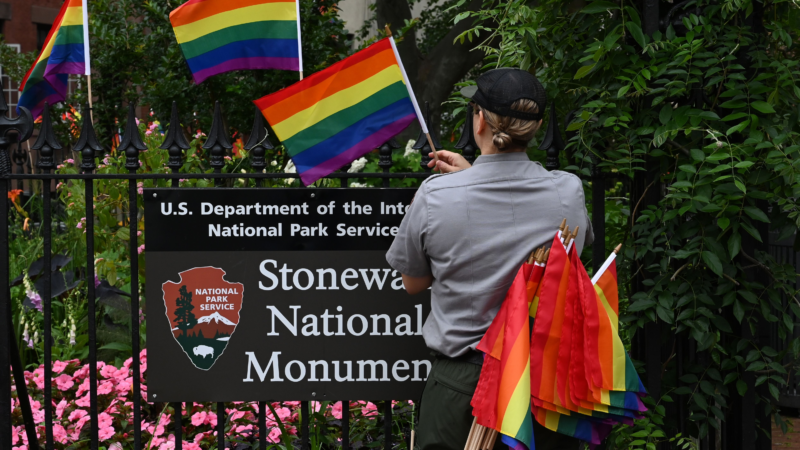Park Service erases ‘transgender’ on Stonewall website, uses the term ‘LGB’ movement
The National Park Service website exploring the history and significance of the Stonewall Uprising has been stripped of any mention of transgender people.
The page was also updated to remove the “T” from the previously used acronym “LGBTQ+” — now, referring to the community as either “LGB” or “LGBQ.” References to the word “queer” have also been removed.
When describing the Stonewall Uprising, the website now reads: “Before the 1960s, almost everything about living openly as a lesbian, gay, bisexual (LGB) person was illegal, but the events at the Stonewall Inn sparked fresh momentum for the LGB civil rights movement!”
It’s not immediately clear who called for the change. But it’s seen as the latest pushback on the transgender community by the federal government since President Trump took office. Over the past month, the Trump administration has issued executive orders to eliminate the idea of a “gender identity” separate from sex and to ban transgender athletes from participating in women’s sports.
“This decision to erase the word ‘transgender’ is a deliberate attempt to erase our history and marginalize the very people who paved the way for many victories we have achieved as a community,” the Stonewall Inn and the Stonewall Inn Gives Back Initiative said in a joint statement.
Timothy Leonard, the Northeast program manager for the National Parks Conservation Association, a group that advocates for the National Park System and pushed for the Stonewall monument, said, “Erasing letters or webpages does not change the history or the contributions of our transgender community members at Stonewall or anywhere else. History was made here and civil rights were earned because of Stonewall.”
The National Park Service did not respond to NPR’s request for comment.
In 1969, a gay bar in New York City called the Stonewall Inn was raided by police, igniting fierce riots and protests that lasted through the night and into the following days. This came after years of raids, beatings and arrests endured by LGBTQ individuals.
While the Stonewall Uprising was not the first push for LGBTQ equality in the United States, it is regarded as a turning point in sparking a nationwide movement for the equal treatment of gay, lesbian, bisexual and transgender Americans.
Among those who played a central role in the struggle were transgender activists, including Marsha P. Johnson and Sylvia Rivera.


Both Johnson and Rivera were present on the first night of the riots. Rivera has been credited to have thrown the second Molotov cocktail.
In the years following Stonewall, Johnson and Rivera founded a group to help homeless trans youth in New York City called Street Transvestite Action Revolutionaries, or STAR. Rivera also fought to ensure transgender people were included in the victories achieved by the gay-rights movement, like the Sexual Orientation Non-Discrimination Act in New York.
It was less than a decade ago, in 2016, when the Stonewall Inn was designated a national monument by President Barack Obama — becoming the first U.S. landmark dedicated to LGBTQ rights and history.
A protest organized by the Stonewall Inn staff and local LGBTQ groups is scheduled at the Stonewall National Monument on Friday afternoon.
Bob Weir, guitarist and founding member of the Grateful Dead, has died at 78
For three decades with the Grateful Dead and three more after the group ended following the 1995 death of his bandmate Jerry Garcia, Weir helped build and sustain the band's legacy across generations.
Nationwide anti-ICE protests call for accountability after Renee Good’s death
Activist organizations are planning at least 1,000 protests and vigils this weekend. Officials in major cities cast Saturday's demonstrations as largely peaceful.
Veteran actor T.K. Carter, known for ‘The Thing’ and ‘Punky Brewster,’ dies at 69
T.K. Carter gained fame as Nauls the cook in John Carpenter's 1982 horror classic, "The Thing."
Who is Reza Pahlavi, the exiled Crown Prince encouraging demonstrations across Iran?
In exile for nearly 50 years, Iran's Crown Prince Reza Pahlavi has issued calls urging Iranians to join protests sweeping the country. But support for him may not be clear cut.
US launches new retaliatory strikes against ISIS in Syria after deadly ambush
The U.S. has launched another round of strikes against the Islamic State in Syria. This follows last month's ambush that killed two U.S. soldiers and an American civilian interpreter.
6 killed in Mississippi shooting rampage, authorities say
The alleged gunman, 24, has been charged with murder after the Friday shootings in northeast Mississippi. The victims include his father, uncle, brother and a 7-year-old relative, authorities said.






